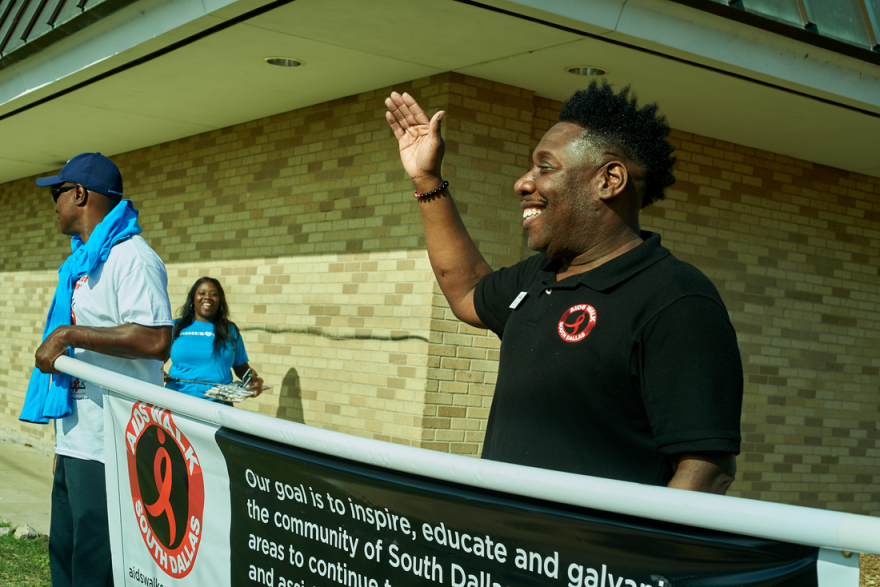A large percentage of people hospitalized with COVID-19 have pre-existing chronic illnesses like diabetes or heart disease. But people with other conditions — like HIV or AIDS — could also be at risk of getting sick with COVID-19. In response, Dallas organizations are working to support people with HIV and AIDS.
Auntjuan Wiley is the founder of AIDS Walk South Dallas.
He's been involved with HIV/AIDS advocacy and prevention for decades. He has also been HIV positive for 27 years.
He said the pandemic has changed a lot of things, but people who are immunocompromised are normally cautious.
"So when it comes to people living with HIV, these are things that we do all the time, except for the six feet and the mask," Wiley said.

The Centers for Disease Control and Prevention said there’s no specific information about the risk of COVID-19 to those living with HIV or AIDS.
Dr. Jason Gillman is an infectious disease specialist with Prism Health North Texas — a group that works with people affected by HIV or AIDS. Gillman said about 20 of his patients who are HIV positive have tested positive for COVID-19, but that they’ve mostly been mild cases.
"I tell my patients that I don't think they're y'know at higher risk of acquiring the infection, I tell them I don't really know if it's gonna be more or less severe than anyone else in the population," he said. "A lot of our patients, 90% of them, their HIV is well controlled. They're undetectable, they have normal T-cell counts, so their immune system is pretty comparable to y'know anyone else out there."
COVID-19 has led some people to avoid seeking medical treatment. However, advocates said people who may have been exposed to HIV or AIDS or sexually transmitted infections should still seek treatmentand get tested.
JP Cano is Prevention Services manager at Resource Center in Dallas. Cano said the Resource Center’s clinic, which provides HIV and STI testing, continued to test people through April and May.
"Because you don't want somebody to have HIV first, they don't know their status, and they're at the hospital with COVID," he said. "So it is so important people still know what their status is for HIV and some other STI's."
People with HIV or AIDS who are low-income or homeless are especially vulnerable right now.
Traswell Livingston is president of AIDS Services of Dallas, which provides housing and support services to low-income and homeless people living with or affected by HIV/AIDS.
Livingston said the pandemic has led the agency to adjust several of its services to reduce face-to-face interactions.
"Fear and just the unknowns about how to protect yourself affected everything and as everything was ramping, our organization put in place some precautions really to protect the residents," he said. "We put in some restrictions on traffic, visitors and just outside non-essential engagement to the property."
People served by AIDS Services of Dallas were already vulnerable before the pandemic.
Medication is expensive and people without the resources can’t afford medicine to control their HIV or AIDS. Some have other illnesses, too.
So in the face of a pandemic, Livingston said support is even more important.
"Our organization is housing a, as far as compromised immune systems, 100% of our residents are in that space, and are low income, and don't have the resources that most have, and our average income for our residents is about $9,900 a year," he said.
Auntjuan Wiley, the founder of AIDS Walk South Dallas, said his group has also had to adjust during the pandemic.
They have monthly educational seminars, support groups and they offer financial assistance for people living with HIV/AIDS. Most clients are Black men in southern Dallas.
"So we're doing a lot of virtual, even for some clients we do drive-bys where we talk to them from their front door, from their patio, from their balcony and make sure they have what they need," he said.
Wiley wants his clients to feel supported even if they can’t see each other in person, "to make sure that we stay connected, to let them know that they are not forgotten."
He said the pandemic postponed his group’s annual AIDS Walk. It’s now set for September.
Wiley's hopeful it’ll happen because people are yearning to gather in person.
Got a tip? Email Galilee Abdullah at Gabdullah@KERA.org.
KERA News is made possible through the generosity of our members. If you find this reporting valuable, consider making a tax-deductible gift today. Thank you.





